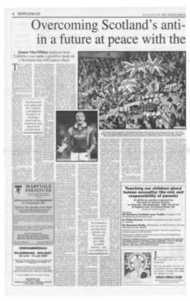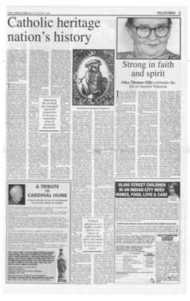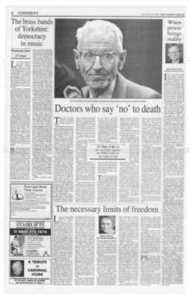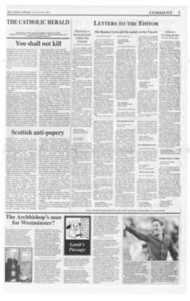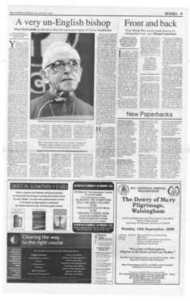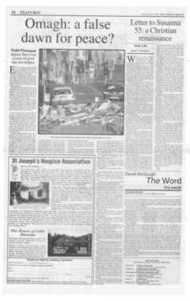Page 4, 20th August 1999
Page 4

Page 5

Report an error
Noticed an error on this page?If you've noticed an error in this article please click here to report it.
Tags
Share
Related articles
Should Catholics Support Moves Towards Scottish...
Leading Composer Attacks Scots' Anti-catholic Bigotry
Scottish Catholics Spurn Labour For Independence
',scotland English Misconcoptions
Will A Liberated Scotland Celebrating The Follow...
Overcoming Scotland's anti in a future at peace with the Catholic heritage nation's history
James MacMillan analyses how
Catholics can make a positive mark on a Scotland that still rejects them
THERE is a palpable sense of optimism in Scotland at this time. Women and men of goodwill detect that the circumstances are ripe with opportunity and challenge. The arrival of our new devolved Parliament, the latest step in the nation's desire to slake its thirst for democracy, seems providential in its timing on the eve of a new millennium. We are fired by a hitherto unparalleled potential to refresh and renew our society in its politics, in its culture and in its soul.
John Haldane, the professor of philosophy and director of the Centre for Philosophy and Public Affairs in the University of St Andrews wrote an article for The Catholic Herald on the eve of the Scottish Parliamentary elections in the spring. In this he expanded on the question of what specific ideals Catholics can offer the new Scotland: "One is the concept of soci ety as a moral community in which responsibilities stand alongside rights, in which material goods are (., produced with an eye to benefit as well as to profit, and in which the value of life is respected as well as its quality being promoted. Intellectually and culturally the Catholic mcOritribution-should be to challenge materialism, instruinentalisin,' hedonism and short,. term gratification, and to present in a Scottish context the central ingredients of the Catholic philosophy of culture: abstract reflection, artistic endeavour and joyous good living."
As a composer I have become increasingly aware of the significance of this Catholic influence and inspiration behind my work —whether in its theology and philosophy, or in its liturgy, or simply in the encultured experience of my own localised upbringing in the west of Scotland. Since childhood I was brought up to deal with reflective abstract concepts from the purely religious sphere to the artistic sphere, although these two things are one and the same for me. And in my fruitful engagements with other artists, regardless of their own religious beliefs, I have found these to be common concepts. It is as if on one hand, the adherent of a sacramental religion and on the other the artist, although they may speak different "languages" and to different purposes, they nevertheless share a common "linguistic" root. The Catholic and the artist, at a fundamental level, can understand each other because the origins of their most precious metaphorical concepts are the same.
For example, the idea of transubstantiation can seem remote, mysterious and irrelevant mumbo jumbo until one analyses a symphony by Beethoven or Maxwell Davies. There, before your eyes and ears, one can see and hear musical material transforming itself into something other than its original apparent substance. A musical theme metamorphoses from one shape into a heightened version of itself through time and development, or can even change its shape and essence into something completely different, while keeping its core recognisable significance.
And lovers of music claim that their lives are changed through music. Being openly receptive to the transforming power of music is analogous to the patient receptivity to the Divine that is necessary for the religious contemplation at the heart of sacramental religion.
I don't like being too selfanalytical but preparing for a talk like this forces you to be. I am sometimes asked if I have an artistic mission as a Scottish composer. If I have a mission I think this must involve acts of our heritage, of a re-awakening of our culture. There has been a forgetting of our past with the result that modern-day Scotland lacks proper cultural roots. In contrast to England, the received history of our nation seems to be one marked by discontinuities, by breaks with, repudiation, and ultimately denial of the past. The greatest discontinuity within the cultural memory is, of course, the Reformation. 1560 became a Year Zero marking the beginning of a cultural revolution — and one could draw interesting parallels between Mao Tse Tung and John Knox, Pol Pot and Andrew Melville (well, perhaps not). This cultural revolution involved a violent repudiation of art and music from which it could be argued we have not fully recovered. So a Scottish composer like myself is left with only fragments of a broken past.
All that we have left from distinctively Scottish music are the remnants of plainsong, such works of the Scottish Renaissance as survived the 1560 cultural revolution, Gaelic psalmsinging from the Western Isles, and follcsinging from the Lowland peasantry. So, if one is to pick up the pieces and maintain continuity with Scotland's past, contemporary Scottish music could be infused by those disparate fragments of Latin, Gaelic and Scots tradition. And given the history of the religiouslyinspired conscious destruction and abandonment of our musical heritage, contemporary music is channelled to reflect and express this violence and turbulence rather than simply harmonic pastoral. As Catholics, we can serve an important cultural role. We are not afraid of pre-1560 Scottish history. We can embrace it because in its Catholicism it chimes in with our continued cultural expression.
The fact that many in the arts recognise the importance of reconnecting with our past, and the analogies and parallels between the sacrament and art that I mentioned earlier, could be why, of all the spheres of public life in Scotland, the world of the arts is the one arena where I have never encountered anything approximating to the visceral antiCatholicism which so disfigures many other walks of life in our society.
On my trips abroad or to England I am often asked curious, probing questions about my country, and specifically about the extreme nature of our anti-Catholic past and rumours of a still-prevalent sour anti-Catholicism. This is mainly sparked by the activities of our referees and our sporting bodies, but sometimes it can be about much more.
A foreign academic brought it to my attention that the Collins Encyclopaedia of Scotland has no entry for the Irish in Scotland or the Catholic Church. Foreign visitors to Edinburgh attended an exhibi tion a couple of years ago at the Scottish Record Office, recounting the history of irnmigration to Scotland. Large displays set out the history of the immigration of Flemish weavers, Jewish traders, Italian peasants, Asian shopkeepers, Chinese restaurant owners, black bus conductors, and rightly praised the contribution they had all made to Scottish society. The massive Irish immigration in the 19th and early 20th centuries was dealt with in something like three sentences, as follows: "In the mid-19th century an increasing number of seasonal Irish farm labourers who worked in the summers in lowland Scotland stayed over due to poor economic conditions in Ireland. Many of them became a burden on the local Parish Poor Laws."
Sometimes people I meet are surprised that there is such a thing as a Scottish Catholic — it seems oxymoronic to many. I'm afraid our traditional anti-Catholic phobias and para noias have gained us infamy abroad. These questions embarrass me and I try to say it's not like that any more we have moved on — we are putting sectarianism behind us in the dustbin of history — things have changed for the better. But deep down I know this is a response charged with ambiguity.
Yes, it's true that for many Scots, religious bigotry does not impinge on their lives, but for a significant minority Catholics continue to be a source of puzzlement if not anxiety, and its concomitant bigotry.
Because of this most Scottish Catholics learn at an early age that the best self-defence mechanism is to keep one's head down. Try not to attract attention to the fact that you are a Catholic — it will only annoy them. In fact I know that most Catholics of an older generation would be appalled at me raising this subject at a public forum. There is still, even today, a palpable sense of some threat and hostility to all things Catholic in this country. Some of these anxieties are a result of a lack of selfconfidence among Catholics; some are because of vague and not-so-vague hints that Catholics are not really full citizens —possibly because some of them support a team associated with Irish rather than Scottish roots.
But the sense of threat and hostility is there and has huge implications for the so-called "new era" and Scotland's potential to refresh and renew which I mentioned at the beginning. If Scotland is ever to establish a genuinely pluralistic democracy where differences are not just recognised and respected but celebrated, nurtured and absorbed for the greater good, we will first have to clear a seemingly insurmountable hurdle. In many walks of life — in the workplace, in the professions, in academia, in the media, in politics and in sport — antiCatholicism, even when it is not particularly malign, is as endemic as it is second nature. Scotland is guilty of "sleepwalking" bigotry, a writer recently claimed. The recent unofficial grassroots letter-writing campaign, organised at parish level by the Church of Scotland and some other churches against the inter-faith aspects of prayers at the new Edinburgh Parliament is an indication of this. Although multi-cultural ism and the non-Christian faiths were the main targets of this campaign, The Scotsman reported that many of the letters make disparaging remarks about the Roman Catholic faith.
One point of this talk is to suggest that pluralism need not equate with a bland homogenisation, where differences are ironed out and we all do and think the same. Yes, Scotland is Presbyterian; yes, Scotland is secular. These are two aspects of the national character in which I rejoice wholeheartedly — but I want to celebrate much much more about our country — and I think we all can. The obsessive attempts, historically and contemporaneously, to peripheralise and trivialise the Catholic experience in Scotland (and in particular the Irish Catholic experience) is a selfdefeating tendency. It represents the very opposite of the enriching multicultural pluralism which I crave for this country. Another point of this talk is to suggest that there is much in the Catholic experience, perspective and potential contribution which could be of benefit to wider civic society. Mother point is that we as a nation have to face up to the ignominy of our most prevalent if unspoken bigotry, if we are to move together into the next millennium with a sense of common purpose. Many of us are either happy to live with, or to deny completely the existence or the importance of, an anti-Catholicism which is still a significant element of Scottish culture.
I don't have supreme confidence in the ability of the Scottish media to tackle this topic fairly or seriously. Every time the issue is raised it is hijacked and sidelined into the ubiquitous, banal and knee-jerk injunction that everything would be hunky dory if only we were to abolish Catholic schools. In fact, the Scottish media has become one of the main players in the antiCatholic-schools industry which is now just as much part of the problem as anything else. Fear and alarm are spreading in the Catholic community over what is perceived as an ideologically motivated campaign against Catholic education which seeks to remove a Catholic voice and public presence from Scottish society. The slavering at the mouth, in some quarters, at the prospect of the new Parliament being involved in this vandalism has become a depressing and frightening spectacle for many ohs.
With the Glasgov-based press especially going into campaign mode for tie abolition of Catholic schools, these is a widespread perception among Scottish Cathdics that the media are pre u diced against them. The Herold has a number of feature wriers who regularly and vociferously attack Catholic belief ad practice in unguardedly visceral ways that would neve see the light of day in a Lonicim quality newspaper, or talloid for that matter. English Nritors to Glasgow are regularl bewildered at the strength cf feeling aimed against Catholicism ia The Heralds letters pages. Can you imagine the Englih press working itself into such a lather over any religious belief or practice? Yet it is quite a common occurrence to find in the Glasgow Herald's pages the ridiculing and lampooning of the Catholic concept of tan ---substantiation, the deep pietistic fondness of the Blessed Virgin Mary, and a whole range of other aspects associated with the practice of the faith. One writer regularly and in passing refers to Catholicism and Islam as "false and barbaric religions". Another, with deliberate determination, uses "Catholic schools" and "sectarian schools" as interchangeable terms. T. fully appreciate the truest nature of antiCatholic triumphalism and the hegemonic aspirations of those in our society who would happily see the disappearance of Scottish Catholicism, one has to understand the totemic significance of Glasgow Rangers at the heart of Scottish football. Donald Findlay's now infamous performance of anti-Catholic songs took place in a Ranger's social club next to Ibrox Park. In his autobiography, My life, Andy Goram (until recently Rangers' and Scotland's goalkeeper) boasts of his sympathies for the Ulster Protestant cause. He has made more trips to Belfast than any other player. Along with Ally McCoist he was invited to the Shankill Road in 1995 to turn on the Christmas lights. At the Old Firm game on 2 January 1998, five days after the murder in the Maze Prison of the loyalist murderer Billy Wright, otherwise known as King Rat, Goram wore a black armband. His club, and most of the Scottish press, chose to believe his risible story that this gesture was an expression of delayed grief for an aunt who died the previous October. No great significance was placed on this by the Scottish press, who chose instead to concentrate on Goram's sexual misdemeanours. What would the English press reaction have been had David Seaman ever supported the BNP or Combat 18? Or could you imagine the Scottish press reaction if a Celtic player had dared to wear a black armband for a murdered IRA man? The Scottish tabloid press eventually published a photograph of Goram with a UVF terrorist flag — but this was after he had left Rangers and had moved to Motherwell.
Education, like football, has expanded out of all proportion to become a monstrous focus of sectarian discontent. The anti-Catholic-schools lobby is at work with political figures and activists (such as members of the Education Institute of Scotland). Their pleas will not exactly be met with deaf ears in certain political circles. John Maxton, the Labour MP, and Lord Mackay of Ardbrecicnish, the Tory peer, have been upand-running on this issue for a while. In spite of the friendly noises from nationalist luminaries such as Alex Salmond and Jim Sillars it is usually the SNP who have played the Orange card in local politics of central Scotland.
Was it absolutely necessary for the nationalists in a recent West Lothian by-election to "out" the Labour candidate's Catholic roots by revealing her middle name was "Teresa"?
Was it absolutely necessary for the SNP activists in the 1994 Monklands East by-election, on the death of John Smith, to highlight the religious beliefs, Irishsounding maiden name and Catholic school history of the Labour candidate, Helen Liddell? It undoubtedly played some part in the massive reduction to a 1,600 majority in one of Labour's safest seats, amid regular catcalls of "Fenian bitch" aimed at Mrs Liddell at her public appearances.
Many in the press make much of the high Catholic involvement in the Labour Party in the west of Scotland. There is a constant implication that Catholics have plotted a take-over of political and government organs. This dripdrip propaganda only feeds the imaginations of those who want to believe Catholic conspiracy stories.
But it is not only in the murky world of local politics that these conspiracy stories prevail. It has cropped up in the comparatively enlightened academic world of Glasgow University which recently merged its Faculty of Education with St Andrew's College of Education, the Catholic teacher-training college in Bearsden. There is nothing unusual about Catholic educational institutions having an integral association with larger mainstream universities in other countries. South of the border, for example, Trinity and All Saints College is a Catholic liberal arts college (which incorporates teacher training) and is also a university college of Leeds University. St Mary's College, Strawberry Hill, a similar Catholic institution, is now a college of the University of Surrey. Digby Stuart is a Catholic college and part of the ecumenical Roehampton Institute, also of the University of Surrey. Heythrop College is a Jesuit College which also provides degree courses at the Univer sity of London.
St Benet's Hall and Blackfriars (the Dominican Priory) are well-respected colleges of the University of Oxford. St Edmund's, a Catholic foundation, is also a full university college of Cambridge University.
But the Glasgow merger did not proceed without some unpleasantness.
There was resistance to it from within the university. In some quarters there was great resentment that the Catholic dimension of the new faculty was to be maintained. Professor Eric Wilkinson, the director of higher degrees in the new education faculty, went to The Herald to voice his concerns. He said that he considered that the Catholic Church's motives behind the merger were "imperialistic to the extent of wishing to turn the clock back to before the Reformation" and was "hoping to use its new-found position within Glasgow University to begin that process".
A few days after Wilkinson's outburst there was a letter published in The Herald from Sir Graeme Davies, principal of the university (a New Zealander with a wide experience of education in the real world and its interface with faith communities) which publicly dissociated himself and the university from Professor Wilkinson's remarks. Another letter from the faculty's head of religious education and the director of inservice education delivered a rebuke to their colleague Wilkinson and put the whole thing into perspective, saying: "A metropolitan university seeking to extend its reputation and influence in and beyond the new Scotland should surely be a place which rejects old myths and suspicions and celebrates difference and diversity, recognising the huge spectrum of possibilities for presenting the promise of higher education to all the nation's communities."
Catholics have a lot to offer this society, although I am aware that many would prefer to regard Catholicism just as a lifestyle option to be pigeonholed under "anachronistic reactionary tosh". However, it is a faith that claims universality. Lindsay Paterson of Moray House Institute of Education (a self-confessed Protestant atheist) in his searching analysis, Social Citizenship and Catholic Education, states that "if the implications of that faith can be made relevant to a predominantly secular age, then there might indeed be a coherent basis for maintaining a distinctive and public system of Catholic education".
This is precisely what we want to do — to make our experiences available for the greater good, beyond the Catholic constituency. He also states that "Catholic schools did more to promote the attainment of working class pupils than other schools did. The same is true of other outcomes: for example, among working class pupils with two or more passes (at Higher grade) the proportion going to higher education was 52 per cent from Catholic schools, but only 42 per cent from other schools.
What is more, the social gap in attainment was smaller in Catholic schools than in others; in other words, the Catholic schools were more egalitarian".
Surely this must start bells ringing in Scotland where egalitarianism and inclusiveness are prized as the most important political, social and civic virtues.
"In short," continues Professor Paterson, "Catholic schools have been a classic instance of education's capacity to integrate socially excluded groups into the mainstream."
If this works for us, it will work for others too. On this evidence, far from abolishing them the most radical political initiative would be to extend the influence of Catholic schools in Scottish society, and even create more of them!
Why are Catholic schools such a stunning success story? Paterson cites the researches of J S Coleman in a paper for the American Journal of Sociology, Social Capital in the Creation of Human Capital: "[J S Coleman] found that Catholic schools were more effective than others, and he also found that a plausible explanation of that success lay in the social capital on which they could draw. Their communities were infused with norms that expected high achievement. These norms were enforced partly by what he called 'social closure': pupils' parents tended to know each other, and to be known by officers of the church. So each individual pupil was surrounded outside school by a network of expectation and sanctions, encouraging achievement and discouraging disaffection."
Nowhere in his research does Paterson find evidence that Catholic schools are socially divisive or foster bigotry. Rather "teachers in Catholic schools believed more than teachers in other schools that engaging with the democratic process was worthwhile. So teachers in Catholic schools, far from being agents of intolerance would appear to have quite firm commitments to the ideas of social capital — to the principles that society works best if people respect and trust each other, and that it may work best of all if these values are embodied in enduring civic institutions such as a welfare state".
As I say, we have a lot to offer Scottish society, if only people would stop thinking the worst of us. Catholics welcome the interest which our media are showing in the future of Catholic education in Scotland — but the debate about its future should be a positive and enriching one, enabling us to develop a new and refreshed legitimacy. Professor Paterson states that the best defence of an autonomous system of Catholic education in a highly secular society is that it is a "laboratory of experience, a source of experimental ideas on how to live together that might be of relevance to society as a whole".
In all the positive examples I have cited I have deliberately drawn from those who see the opportunity and challenge of opening Scotland up to a benign Catholic contri bution. In an age of depersonalisation, mass market production and the empty despiritualisation of consumer society this is increasingly difficult. Perhaps the most destructive opposition to Catholicism is not to be found in Orange parades, sour editorials and EIS conference motions, but in the very nature of free market capitalism itself. In facing down this particular beast I believe Catholics can find common cause with countless others in Scotland. This is a real opportunity to turn Scotland's shame into Scotland's virtue.
blog comments powered by Disqus





